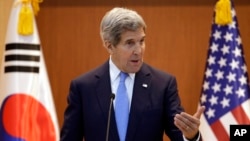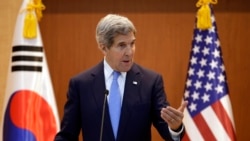The U.S.-South Korea security alliance and overall relationship is stronger than ever, said U.S. Secretary of State John Kerry on a recent trip there.
The biggest common security concern remains North Korea. "Let me underscore," said Secretary Kerry, "there is no daylight. . . between the United States and the Republic of Korea in our approach to the question of North Korea’s provocations and its nuclear program." The U.S., South Korea, and other partners in Northeast Asia are continuing to put persistent, principled diplomacy at the center of our efforts. And the United States continues to offer North Korea an improved bilateral relationship if and when it demonstrates a genuine willingness to fulfill its denuclearization obligations and commitments.
To date, North Korea has not come close to meeting that standard. Instead, it continues to pursue nuclear weapons and ballistic missiles all the while denying its own people fundamental human rights. That is why is the global community must continue to shed light on North Korea’s atrocities against its own people. That’s why it’s important to ramp up international pressure for North Korea to change its behavior. And that is why the United States and South Korea will continue to modernize their alliance in order to counter any threat that North Korea may pose to peace and security on the peninsula.
For the first time, the United Nations Security Council last year took up the issue of North Korean human rights. The regime's abuse of human rights is among the worst in the world, and the U.S. will continue to expose the ongoing atrocities.
The United States will continue to pursue ways in which it can work with South Korea to bring about greater security, prosperity, and respect for human rights in the region.






